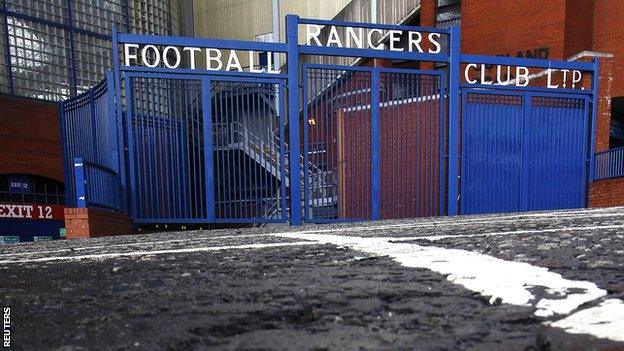The stark truth facing SPL crisis club Rangers
- Published

Gates at Rangers' Ibrox ground
Insolvency experts Duff & Phelps took over at Rangers on St Valentine's Day, but the club's fans are still waiting for that handsome prince to arrive as the emergency regime enters its 72nd day.
Nobody thought this would be straightforward, but what has followed has been particularly gruesome.
More used to trophies than tribulations, Rangers supporters are angry and confused.
It would be an exercise in futility to try to address all of their questions and concerns, but what follows is an attempt to tackle the most fundamental ones.
How have things got so bad?
Quite simply, more than a decade's worth of misdemeanours and mismanagement are finally threatening to pull down a British institution.
But owner Craig Whyte is not the real reason Rangers are staring extinction in the face.
Yes, his use of football's equivalent of the payday loan to buy Rangers, the subsequent denials of this fact, the disregard for the usual standards of corporate behaviour and his cynical use of taxpayers' money to replace his own funding add up to quite a rap sheet.
But the 40-year-old businessman was only given the stage to display his talent for controversy because predecessor Sir David Murray's 23-year reign at Ibrox left Rangers vulnerable.
The club Whyte bought - for a pound - was already under investigation for the abuse of two tax-avoidance schemes, was struggling to clear its debts from a decade of over-spending and had been on the market for five years.
The man with "off-the-radar wealth" should never have got near a club of Rangers' magnitude. But the club's bankers had had enough of propping up Murray, so Whyte was waved through the gates.
So Rangers are doomed, then?
No, but time is running out. Administration is a last-ditch attempt to see if a company on the slide can be pulled back from the brink.

Rangers manager Ally McCoist
Rangers entered this limbo state because HM Revenue and Customs (HMRC) wanted to close the club down over £14m in taxes that Whyte had snaffled.
That, however, is only a fraction of the taxman's claim. You can add up to £75m to that for tax-avoidance schemes operated by Murray. The greater part of that sum is being looked at by a tribunal, and a decision is imminent.
When you add these debts to all the other sums owed - the usual litany of honest traders and unlucky suppliers - you are looking at an estimated bill of £134m.
That is the bad news. The good news is that administration can make a lot of this disappear, providing they find a buyer who can persuade the creditors to accept a fraction of what they are owed.
Rangers have been badly run, no question of that, but they have a nice ground, decent training facilities, lots of supporters and a grand history.
Great, so when will somebody buy them?
Back to the bad news. Rangers are simply not in a position to be bought. The poison from the last two regimes is still seeping out and only a fool would attempt to buy lock, stock and liabilities at present.
The big question for any potential buyer is: "What am I buying?"
The answer to that changed significantly on Monday when the Scottish Football Association (SFA) announced its sanctions for the sins related to Whyte's takeover and subsequent shenanigans.
A lifetime ban from Scottish football for Whyte and £360,000 in fines for him and the club sound tough, but it is the 12-month embargo on registering new players that really hurts.

Andrew Little scores against St Mirren in the recent 3-1 SPL win at Ibrox.
Trading players is a fundamental activity for any club. With no prospect of being able to replace sold players for a year (apart from under-18s), any new owner would be going into battle with both arms tied behind his back.
The only business model that makes sense for a new owner of Rangers is to get them back to normal - winning things, playing to packed houses - as soon as possible.
The "transfer ban" makes that unlikely, particularly when you remember that many Rangers players gave up a huge chunk of their wages in return for the promise that they can go this summer if the club looks doomed, or if the ownership situation remains unresolved.
Throw in the impending tax bill and you have more variables than any sane businessman would ever countenance.
I thought you said there was hope?
There is, but it is hope of the relative variety.
For the reasons listed above, there is a diminishing chance of a plan emerging that will satisfy the company's creditors and stakeholders, whilst leaving it fit for purpose on the playing field.
This is leading many to conclude that what Rangers need is rebirth. Even manager Ally McCoist has begun to wonder if it might be easier to start all over again in Division Three.
In business terms, this means liquidation. American tow truck tycoon Bill Miller was half right in that there are end-of-the-line liquidations and there are let's-start-again liquidations.
But his £11.2m plan is still a liquidation and the trade-off for shedding all that debt is further sporting sanctions, including a three-year ban from European football.
OK, it is liquidation, but when?
A liquidation could come next week, next month, or next year, it does not really matter.
What matters is what type of company emerges with Rangers' key assets, who is in charge, and what league that company's team is playing in.
Sadly, we are still some way off being able to answer those questions.
For a start, Miller's bid is unlikely to succeed, mainly because it is conditional on the football authorities waiving the right to punish Rangers for any further rules breaches that their investigations uncover.
In the eyes of many observers, that would make a mockery of the rulebook and destroy Scottish football's reputation.
Miller's main rivals, the Blue Knights consortium of wealthy Rangers fans, have so far been vague on detail.
They have said they want to save the current company, remove Whyte and negotiate a deal with creditors, principally the taxman, but they have never explained how they would pull off these minor miracles.
The onus now is on the prospective bidders to set out what kind of Rangers they can afford to fund going forward: the one that has been in existence for 140 years, or a new one that shares the old club's DNA?
The rest of Scottish football must then decide if this solution fits with their competing desires for justice versus the life-giving revenues that Rangers provide.
Sunday's visit to SPL champions Celtic is bound to be difficult for Gers fans, but it will also remind everybody else just how vibrant the Old Firm brand remains.
There are many in Scotland who want Rangers humbled, but do they really want to bury them?